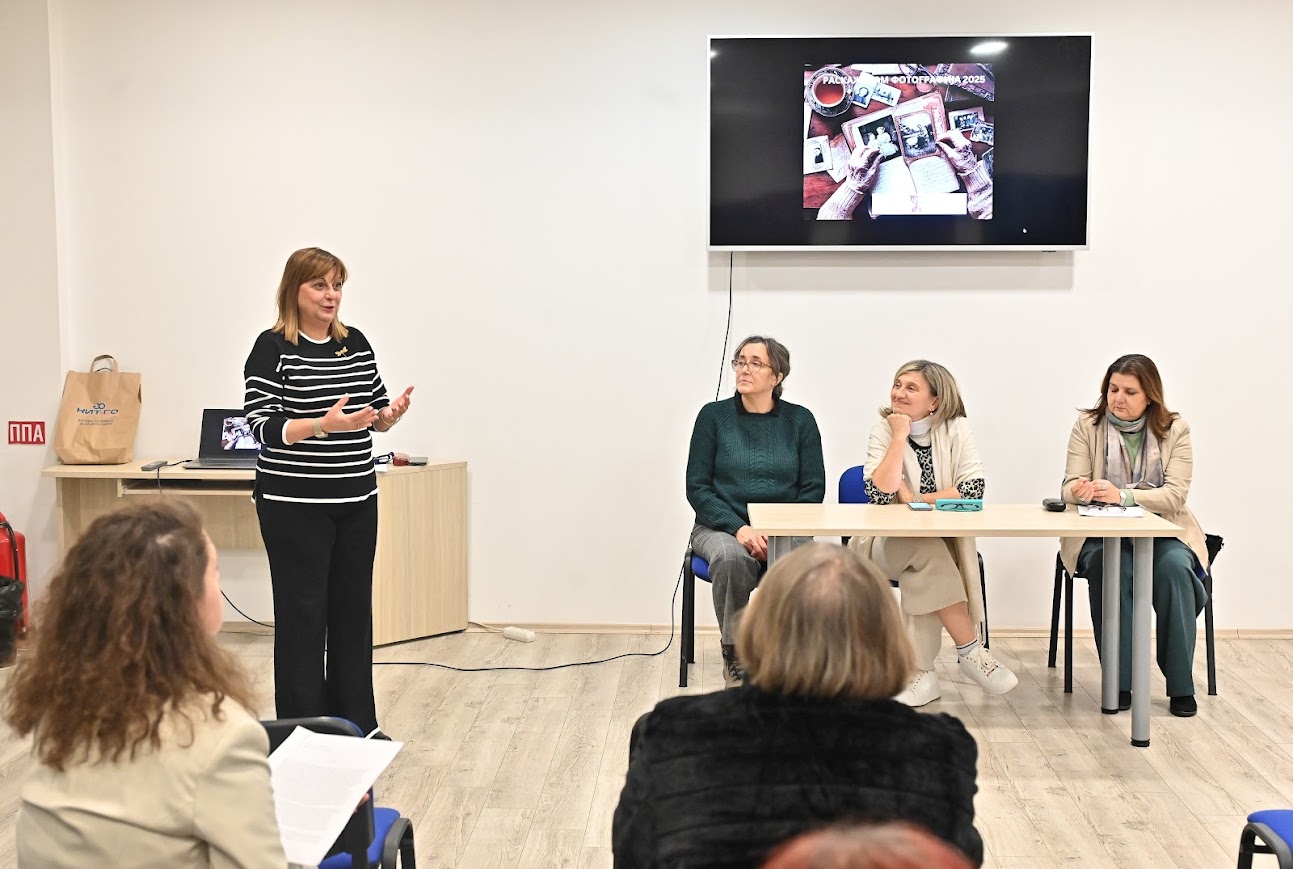ZHAMILA KOLONOMOS (CVETA)

Zhamila Kolonomos was born on 19 June 1922 in Bitola, to mother Estherina Samuel Frances and father Isak Kalef Kolonomos. The closest family also included her sisters Bella and Rachela and the brothers Kalef and Menachem, victims of the Holocaust. In one of her interviews, she says that she kept the surname Kolonomos, because she is the only survivor from the whole family that ended up in Treblinka. She graduated from the Faculty of Philosophy in Skopje. She was married to Avram Sadikario, with whom they have a son, Samuel Sadikario. She was especially proud of her two granddaughters, Hannah and Leah. She died in Skopje on 18 June 2013.
As a member of the League of the Communist Youth of Yugoslavia (SKOJ) and one who joined the partisan resistance in the beginnings, she was a prominent organizer of the Jewish youth in the NOD from April 1941. She was accepted as a member of the Communist Party of Yugoslavia (KPJ) in April 1942. Immediately afterwards, she went into illegal work. In the book "Jevrejke Govore" (the Jewish Women Speak) by Jasha Almuli, Zhamila says that she had three lives, as the life was passing her by three times. She manages to avoid the collection and deportation of the Jews from Bitola. With a few Jewish friends, she joined the partisans in April 1943 and became a fighter of the Bitola People's Liberation Partisan Detachment "Goce Delchev". She was a Deputy Political Commissioner in the First Macedonian-Kosovo National Liberation Strike Brigade and Deputy Political Commissioner of the Forty-second (Macedonian) Division of the National Liberation Army of Yugoslavia (NOVJ), Secretary of the Battalion, Brigade and Division Committee of the Communist Party of Macedonia (KPM). She was later elected a member of the District Committee of the KPM in Bitola and a member of the Regional Committee of SKOJ for Macedonia since December 1944. In her book "The Resistance Movement and the Jews from Macedonia", published by the Holocaust Fund of the Jews from Macedonia, she describes many events of the partisan detachments and the participation of the Jews in the resistance and liberation. It also mentions her participation in the February campaign, about which she wrote: “...An odyssey that did cost us many casualties and torment."
After the war, Kolonomos was honored several times for her merits and bravery and was a leading official in many political, charitable and social associations. She was an official of the Antifascist Front of Women (AFZh) of Macedonia, Secretary of the District People's Board in Tetovo, candidate for member of the Central Committee (CK) of the KPM where she was elected at the First Congress of the KPM and member of the Central Committee of the KPM elected at the Second, Third and Fourth Congress of the Central Committee of the KPM/ SKM, Head of the Personnel Department in the Government of the People's Republic of Macedonia, Member of the Agitprop of the Central Committee of the KPM, Member of the Personnel Commission of the Central Committee of the KPM, Member of the Parliament of the Socialist Republic of Macedonia (SRM) in several mandates, President of the Union of Women's Associations of Macedonia, President of the Republic Council of the Associations for Protection and Education of Children and activist of the later-established Council for Care and Education of Children of Macedonia. In 1962 she was elected Professor Emeritus of the Department of Romanian Philology at the Faculty of Philosophy in Skopje. She is bearer of the Commemorative Medal of the Partizans from 1941 and the Medal of Brotherhood and Unity with a Gold Wreath. She is the author of a number of texts and works in the field of history, the Judeo-Spanish language (the language of the Sephards) and of the Yugoslav-Macedonian resistance.
• Poslovice, izreke i priče Sefarda, Beograd, 1978; • Evreite vo Makedonija vo Vtorata svetska vojna (1941-1945), t. 1-2, Skopje, 1986; • 500 godini od evrejsko-španskiot jazik vo Makedonija, Sefardski odglasi. Studii i sekavanja za Evreite vo Makedonija, Skopje, 1995, 53-64; • Migraciite na Evreite vo Makedonija od antičko vreme do denes, Sefardski odglasi. Studii i sekavanja za Evreite vo Makedonija, Skopje, 1995, 77-85; • Učestvoto na Evreite od Makedonija vo narodnoosloboditelnoto dviženje i revolucijata, Sefardski odglasi. Studii i sekavanja za Evreite vo Makedonija, Skopje, 1995, 102-147; • Evreite vo Makedonija i nivniot jazik, Sefardski odglasi. Studii i sekavanja za Evreite vo Makedonija, Skopje, 1995, 224-249; • Morfologija na evrejsko-španskite govori vo Bitola i Skopje, Sefardski odglasi. Studii i sekavanja za Evreite vo Makedonija, Skopje, 1995, 250-270; • Evreite vo Makedonija i nivniot jazik, Jazicite na počvata na Makedonija, MANU, Skopje, 1996, 111-126; • Morfologija na evrejsko-španskite govori vo Bitola i Skopje, Jazicite na počvata na Makedonija, MANU, Skopje, 127-138; • Sinteyas de los sefardes de la Makedonia: memoria, uzos, mantinision, Skopje, 2005; • Evrejskite zaednici vo Makedonija do 1941 godina, Skopskite Evrei, Skopje, 2002, 7-51; • Monastir without Jews, New York, 2008 (memories).
The Holocaust Memorial Center of the Jews from Macedonia displays her testimonies and memories.
/g75.jpg)
/g76.jpg)
/g77.jpg)
/g78.jpg)
/g79.jpg)
/g80.jpg)
Share: << Back
Any help from you is more than welcome.
Donate to continue with the successful work and education




